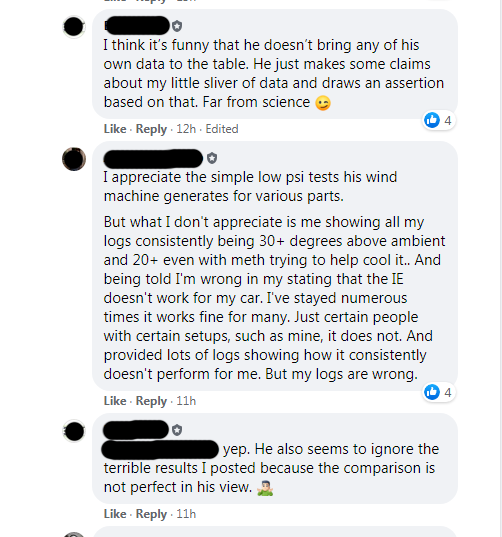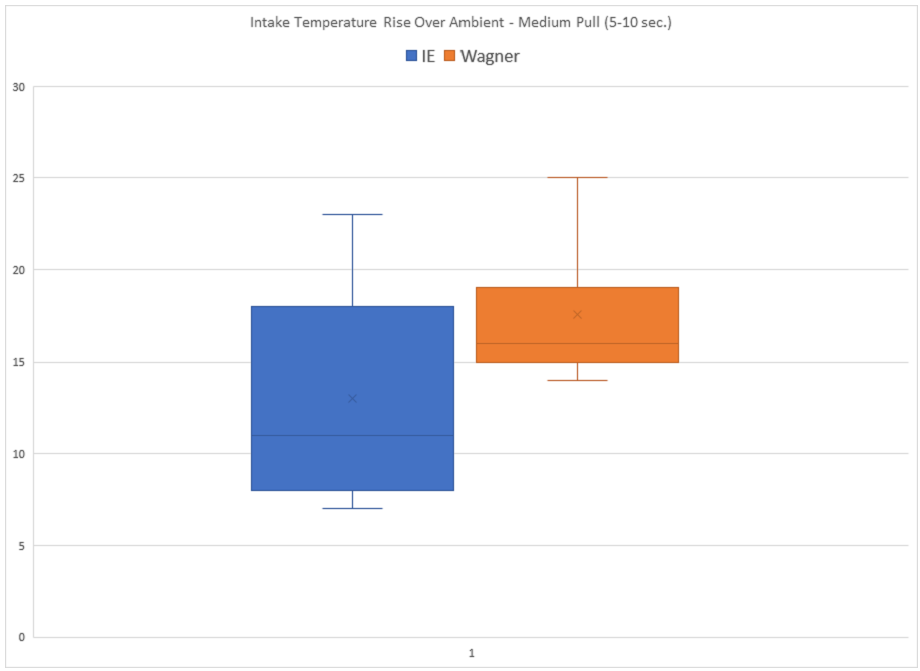Background:
Recently the Integrated Engineering version 1 intercooler was removed from my GTI after logging performance data. My experience with testing the product has included flow bench testing of pressure drop, a comparison with other products in cooling efficiency by way of a bench test, and on the street temperature and pressure measurements. The results that I have recorded have been consistent with the results I have seen in data logs recorded by other owners.

The Problem:
Several months ago statements started popping up that on some cars the IE intercooler did not work well. Curious about this sometimes poor performance led me to search for evidence of it occurring.
Examples were scarce and assumptions I saw associated with the conclusion didn’t hold up to critical examination. Posing questions about the source data and assumptions did not get me closer to an answer.

Data Analysis:
The basis for the claim about the IE v1 intercooler not performing well on some cars seems to have been based on two data sources, a dyno chart and data logs from the car owner who made the second comments above.
In the initial post on this subject I covered why I have concluded the dyno data was unreliable for the comparison it was being used for. In this post I’ll be evaluating the data logs from the owner’s car, referred to as Car A hereafter.
Note: I have not stated the owner or their data is wrong, I have asserted other intercoolers are unlikely to perform better than the IE intercooler under similar conditions.
Expectations:
A statement was made by the owner of Car A that when using the IE intercooler intake air temperatures of 30+ degrees above ambient were being recorded and their expectation was that the IE intercooler should keep IAT within single digits of ambient.
Conditions:
Before discussing the data it is worth reviewing some conditions that can affect the attributes being measured. In the case of charge air intercoolers, some factors in a typical data log that contribute significantly to the IC output air temperature are: the pressure of the charge air, which affects the charge air temperature, the mass flow rate, which can be roughly estimated based on engine speed, time under load, and outside air temperature. Vehicle speed can also contribute by changing the supply of cooling air to the intercooler.
Looking at the data logs of Car A while using the IE intercooler some conditions that are not common to other data logs I have seen were identified. These were:
- On average boost peak was 34 psi and it was not uncommon to see sustained boost pressure of 35-37 psi.
- Multiple gear pulls of 1st thru 4th, or 5th, and 3rd thru 5th were common that could last 10-13 seconds.
- Engine RPM during multiple gear pulls often remained between 5500 and 7000+ RPM.
These conditions create a situation where the turbocharger is discharging very hot air, likely in excess of 400 degF. There is a large quantity of hot air being produced in order to fill the cylinders with the engine turning upwards of 7000 RPM. The multiple gear pulls increase the time that the charge air intercooler is exposed to the high volume, high temperature, air.
In comparison, it’s not uncommon to read a comment from someone with Car B stating that they are recording IAT within ten degrees of ambient and they describe their car as having an IS20 turbocharger using a JB4 device, (that data logs show tapers boost down to 15 psi by the end of the pull), and the data being quoted was recorded during a single third gear pull that concluded just past 6000 RPM.
If differences in operating conditions are not accounted for it would be easy to conclude Car A’s intercooler is performing much different from Car B, even if they had the same model intercooler.
Time Divisions:
To better understand the affect that time under load has on the results, data from Car A when using the IE intercooler was divided into three time periods. These time periods are pulls that last 0-5 seconds, 5-10 seconds, and 10-15 seconds. Data points from Car A are shown with box plots for each of these time periods:

Note: A typical third gear pull would fall into the 0-5 second grouping.
Not surprisingly, as the time under load is increased the intake air temperature rises.
Going back to the owner’s expectation about the performance of the IE intercooler, in third gear at 6,000 RPM, including acceleration through prior gears, and boost pressure of 34 psi, the average IAT is 8.6 degF above ambient. This correlates well with data recorded using my GTI and with data I have reviewed from other GTI/Rs using the IE v1 intercooler.
Conclusion: On Car A the Integrated Engineering intercooler is performing normally, under typical operating conditions.
So what?
The concern was that the Integrated Engineering v1 intercooler is not performing well on this car. The owner believed AMS, APR or Wagner would perform better.
The owner switched to a Wagner intercooler which provides the opportunity to compare results against those with the Integrated Engineering IC.
Versus Wagner
Comparing short term pull data (0-5 sec) the IE intercooler has a median cooling advantage of 5.5 degF.
Note: Median was used instead of average due to only having 6 data points for the Wagner IC. The median value is represented by the line across the box. The mean value (average) is shown with the x.
The performance comparison of these intercoolers is shown in the chart below (IE 14 observations, Wagner 6 observations):

Over a medium pull (5-10 sec.) the Integrated Engineering intercooler maintains a median 5.0 degF advantage over the Wagner intercooler (IE 24 observations, Wagner 7 observations). This result is shown below:

Note: In both cases a t-test was used to hypothesize if the mean temperature rise for the two intercoolers are equal. With an alpha of 0.05 that hypothesis is rejected.
Conclusion:
The claim that the Integrated Engineering intercooler performs poorly on this car with a hybrid turbocharger depends on what “poorly” means. The owner of Car A expected IAT to remain within single digits of ambient. During a typical 3rd gear pull, commonly used for reporting IC performance, the IE met that criteria.
When the duration of the “pull” was extended to roughly three times longer the mean temperature rise exceeds 20 degrees Fahrenheit.
The conditions the owner operates Car A under produced “worse” results, higher IAT over ambient, when operating with the Wagner intercooler.
Data from the logs of Car A using the Integrated Engineering and Wagner intercoolers supports my hypothesis that the IE performance is no worse than that of other intercoolers available for use on the Mk7.
Why the analysis?
Unusual results such as what were claimed for the Integrated Engineering intercooler are interesting to investigate. They raise questions that can lead to better understanding about factors that contribute to the product performance.
Additionally, carefully analyzing data and conclusions can uncover invalid assumptions, measurement errors, analysis mistakes, and conclusions that lack a solid basis.
Both reasons for looking into an issue can help with making better decisions about what product to use on my GTI, especially if relying on data and advice from other owners or vendors.
The discussion I joined was started by somebody asking for advice about buying the Integrated Engineering intercooler. They were cautioned against purchasing the IE intercooler due to poor results on some cars and advised to “Get AMS”.
I have not seen data that shows the IE intercooler performs worse than other intercooler options.


Please come drive and log my car yourself as that is the only way you can measure or test the claims on the said car. Your articles regarding my claims “for my car” aren’t going to magically make my IATs better on this or that intercooler. It was repeatedly stated every time that the IE intercooler performs well for others but my personal experience was given. As were others afterwards. It doesn’t matter what your personal results were, you aren’t in my car and experiencing what I experience (or the other’s that spoke up and had much improved results with the same modifications with the only difference being the IC) and no matter what you conclude, it doesn’t magically make the IE intercooler all of a sudden perform better from what it was doing before on mine or other’s cars where it was performing not so well. You also left out that meth was used to help and even then it was awful. This should eliminate the whole “But you ran 35psi so turbo outlet temp was high” argument.
The intercooler was swapped, and I (and the others who made such claims) got much better repeated results after, end of story, not sure why you continued to harp on it months later. Barely seeing this now. smh.
I disagree that I need to drive a car in order to evaluate how the intercooler performs.
I didn’t find “others” data that showed abnormal performance from the IE IC. All of the data that I have found has been consistent in showing the IE performs no worse than other quality ICs.
I have only found claims about the IE having sub-par performance, no evidence to support the claims.
The data logs didn’t show much better results with the Wagner IC vs IE.
This comparison was brought up after a time to allow for a sufficient quantity of results to compare.
Jan-2023 Update:

Although Aaron’s (Anonymous commenter above) logs were used for making the IE vs Wagner comparison in this post, with time the story Aaron tells is that I ignored these data logs.